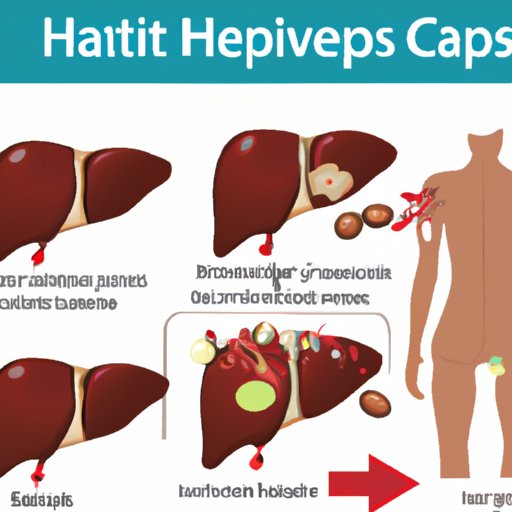
Introduction
Hepatitis C, or hep C for short, is a viral infection that attacks the liver. This disease is caused by the Hepatitis C virus, which is spread through blood-to-blood contact. Unlike some other forms of hepatitis, there is no vaccine for hep C, but there are treatments that can help manage the symptoms and even cure the infection in some cases. Recognizing the symptoms of hep C is crucial for early detection and treatment. In this article, we’ll provide a comprehensive guide to understanding the signs, risks, and treatment options for hep C.
Comprehensive Guide to Hepatitis C Symptoms: Signs, Diagnosis, and Treatment Options
There are several types of Hepatitis C, diagnosed by genotype. Genotyping helps health care providers learn which treatment will be best for the patient. There is also a difference between acute and chronic hepatitis C. Acute hepatitis C is a short-term infection that occurs within the first 6 months of exposure to the virus, while chronic hepatitis C is a long-term infection lasting 6 months or longer. Many people with acute hepatitis C do not experience symptoms, which is why being tested for the virus is so important. The following are the most common symptoms associated with hep C:
Common Symptoms of Hepatitis C
– Fatigue
– Joint pain
– Abdominal pain
– Nausea and vomiting
– Dark urine
– Loss of appetite
– Clay-colored stools
– Jaundice (yellowing of the skin and eyes)
It’s worth noting that many of these symptoms can be nonspecific, meaning they can be easily attributed to other health issues. For example, fatigue and joint pain are common in many different conditions. That’s why it’s crucial to talk to your healthcare provider if you experience any of these symptoms.
Diagnostic Testing for Hepatitis C
If you and your healthcare provider suspect you may have hep C, diagnostic testing is necessary to confirm the diagnosis. The most commonly used test for hep C antibodies involves taking a blood sample and testing it in a lab. If this test comes back positive, additional testing is necessary to determine if the virus is still present and if the infection is acute or chronic. Other types of tests include RNA testing, which identifies the specific strain of the virus, and liver function tests, which measure the functioning of your liver.
Treatment Options for Hepatitis C
There are several treatment options available for hep C, including medications that help manage the symptoms and antiviral therapies that can cure hep C altogether. Medications such as acetaminophen may be used to relieve pain and fever, while antiviral therapies such as direct-acting antivirals may be used to target the virus itself. Some examples of antiviral drugs include sofosbuvir, ledipasvir, and ribavirin. The specific treatment plan will depend on the type of hep C you have and how advanced your infection is. Be sure to discuss your treatment options thoroughly with your healthcare team and follow their recommendations closely.
The Silent Killer: Understanding Hepatitis C Symptoms and Risks
The Hepatitis C virus is spread through blood-to-blood contact. This means that you are at greater risk if you have ever injected drugs, gotten a tattoo or piercing with unsterilized equipment, had a blood transfusion or organ transplant before the blood supply was screened for Hepatitis C, or were born to a mother with Hepatitis C.

Risks Associated with Hepatitis C Infection
If left untreated, Hepatitis C can cause liver damage, cirrhosis, liver cancer, and even liver failure. Some people with hep C may also experience extrahepatic manifestations, meaning symptoms that occur outside the liver, such as joint pain or skin rashes. Additionally, people with hep C are at a higher risk for other health issues, such as Type 2 diabetes and heart disease. It’s important to note that not everyone who acquires Hepatitis C will experience these complications, but the risk does increase if the infection is left untreated or if the person has other health issues.
Stigma and Myths Surrounding Hepatitis C
Unfortunately, there is still a lot of stigma surrounding Hepatitis C, which can make it difficult for individuals to feel comfortable seeking treatment. Some common myths surrounding hep C include:
– Only people who use drugs or have unprotected sex can get Hepatitis C.
– You can tell by looking at someone whether or not they have hep C.
– There’s no cure for hep C.
It’s important to educate yourself and others about the facts surrounding hep C. Anyone can contract the virus, and it’s not always apparent who has hep C based on appearance. Additionally, while there is no vaccine for hep C, effective treatments are available, and many people are cured with antiviral therapy.
A Closer Look at Common Hepatitis C Symptoms and Their Potential Complications
As we mentioned earlier, the symptoms of hep C can be nonspecific, meaning they can be easily attributed to other health issues. However, if you experience any of the following symptoms, it’s essential to seek medical attention:
Fatigue and Weakness
Many people with hep C experience fatigue, which can range from mild to severe. This may be due to a combination of factors, including the virus itself, medications, and other health issues like anemia or depression.
Abdominal Pain and Digestive Issues
Abdominal pain, nausea, and vomiting are common symptoms of hep C. Some people may also experience digestive issues like diarrhea or constipation. These symptoms can be caused by the virus itself or other factors like medications or liver damage.
Joint Pain and Muscle Aches
Joint pain and muscle aches are common among people with hep C. These symptoms may be caused by the virus itself or other health issues like arthritis or fibromyalgia.
Skin Problems
People with hep C may experience a variety of skin problems, including itching, dry skin, and rashes. These symptoms may be caused by the virus itself or other factors like medications or liver damage.
Complications of Chronic Hepatitis C Infection
If left untreated, Hepatitis C can cause liver damage, cirrhosis, liver cancer, and liver failure. Some people with hep C may also experience extrahepatic manifestations, meaning symptoms that occur outside the liver, such as joint pain or skin rashes. Additionally, people with hep C are at a higher risk for other health issues, such as Type 2 diabetes and heart disease.
Hepatitis C Symptoms: What You Need to Know to Spot the Signs and Get Help
It’s essential to recognize the symptoms of hep C and seek medical attention if you experience any of them. Early detection and treatment can help manage symptoms and prevent complications. If you’re concerned that you may have been exposed to hep C, talk to your healthcare provider about getting tested. In some cases, self-care and lifestyle changes can also help manage the symptoms of hep C. These can include things like getting regular exercise, eating a healthy and balanced diet, avoiding alcohol and tobacco, and reducing stress.
Steps to Take for Diagnosis and Treatment
To diagnose hep C, your healthcare provider will take a blood sample and send it to a lab for testing. Once your diagnosis is confirmed, your healthcare team will work with you to develop a treatment plan that meets your needs. This plan may include medication, lifestyle changes, and regular check-ups to monitor your liver function. It’s essential to follow your treatment plan closely and communicate regularly with your healthcare provider about any changes in your symptoms or progress.
Resources for Hepatitis C Education and Support
If you or someone you love is living with hep C, there are many resources available for education and support. The American Liver Foundation is a nonprofit organization that provides information and resources for liver health and Hepatitis C. The Hepatitis C Association is another nonprofit organization that provides support for people living with Hepatitis C. Your healthcare provider can also provide you with information about local support groups and services in your area.
From Fatigue to Jaundice: Learning to Recognize the Range of Hepatitis C Symptoms
The symptoms of Hepatitis C can vary widely, ranging from fatigue and joint pain to more severe symptoms like jaundice and liver failure. It’s essential to recognize the range of symptoms associated with hep C and seek medical attention if you experience any of them. Here are a few case studies of individuals with Hepatitis C, highlighting the range of symptoms:
Case Study 1: John
John is a 45-year-old man who was diagnosed with Hepatitis C after experiencing fatigue and joint pain. He was also experiencing digestive issues like nausea and vomiting. John’s healthcare provider successfully treated his hep C with antiviral medication, and John’s symptoms improved significantly within a few weeks of starting treatment.
Case Study 2: Sarah
Sarah is a 30-year-old woman who was diagnosed with Hepatitis C after experiencing severe fatigue, abdominal pain, and skin rashes. Her healthcare provider discovered that she had liver damage due to chronic Hepatitis C infection. However, with proper medical care and treatment, Sarah’s liver function improved significantly, and her symptoms resolved.
Conclusion
Hepatitis C is a serious viral infection that can cause significant health complications if left untreated. Recognizing the symptoms is crucial for early detection and treatment. If you or someone you love is experiencing any of the symptoms of hep C, it’s essential to seek medical attention right away. With proper medical care, hep C can be treated and managed effectively.
If you have been diagnosed with Hepatitis C, it’s important to work closely with your healthcare team to develop a treatment plan that meets your needs. Remember that there are many resources available for education and support. Don’t hesitate to reach out for help if you need it. Together, we can raise awareness about Hepatitis C and work to stop the spread of this silent killer.




